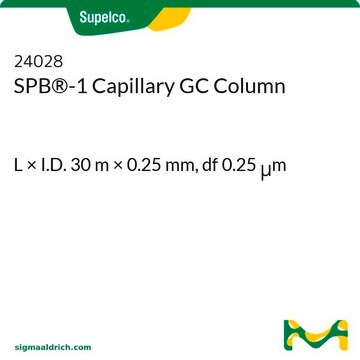24029
SPB®-1
L × I.D. 30 m × 0.25 mm, df 1.00 μm
Iniciar sesiónpara Ver la Fijación de precios por contrato y de la organización
About This Item
UNSPSC Code:
41115710
eCl@ss:
32119290
Productos recomendados
material
fused silica
Quality Level
agency
meets requirements for USP G1, G2, and G9
parameter
-60-320 °C temperature (isothermal or programmed)
Beta value
63
df
1.00 μm
technique(s)
gas chromatography (GC): suitable
L × I.D.
30 m × 0.25 mm
matrix active group
Bonded; poly(dimethyl siloxane) phase
column type
capillary non-polar
¿Está buscando productos similares? Visita Guía de comparación de productos
General description
Application: This column is often used for traditional general purpose applications, where a non-polar column is required. Analytes will be separated primarily according to boiling point.
USP Code: This column meets USP G1, G2, and G9 requirements.
Phase:
USP Code: This column meets USP G1, G2, and G9 requirements.
Phase:
- Bonded
- Poly(dimethyl siloxane)
- ≤0.32 mm I.D., <2 μm: -60 °C to 320 °C (isothermal or programmed)
- ≤0.32 mm I.D., ≥2 μm: -60 °C to 300 °C (isothermal or programmed)
- ≥0.53 mm I.D., <2 μm: -60 °C to 300 °C (isothermal) or 320 °C (programmed)
- ≥0.53 mm I.D., ≥2 μm: -60 °C to 260 °C (isothermal) or 280 °C (programmed)
Application
SPB®-1 Capillary GC Column was used for speciation of the nitrogen compounds (quantitatively), which are polar and somewhat basic in nature, with chemiluminescence detection.
Other Notes
We offer a variety of chromatography accessories including analytical syringes
Legal Information
SPB is a registered trademark of Merck KGaA, Darmstadt, Germany
Storage Class
11 - Combustible Solids
wgk_germany
WGK 1
flash_point_f
214.0 °F - closed cup
flash_point_c
101.1 °C - closed cup
Elija entre una de las versiones más recientes:
¿Ya tiene este producto?
Encuentre la documentación para los productos que ha comprado recientemente en la Biblioteca de documentos.
Hiromi Kitano et al.
Journal of colloid and interface science, 282(2), 340-348 (2004-12-14)
Telomers of N,N-dimethyl-N-(3-sulfopropyl)-3'-methacryloylaminopropanaminium inner salt (SPB), 2-methacryloyloxyethyl phosphorylcholine (MPC), and N,N-dimethyl-N-(1-carboxymethyl)-2'-methacryloyloxylethanaminium inner salt (CMB) were prepared by UV irradiation in the presence of N,N,N',N'-tetraethylthiuram disulfide and a disulfide-group-carrying iniferter (a compound which pursues initiation, chain transfer, and termination), Cys-BDC, which
David Schleheck et al.
Applied and environmental microbiology, 70(7), 4053-4063 (2004-07-09)
Parvibaculum lavamentivorans DS-1(T) utilized the commercial surfactant linear alkylbenzenesulfonate (LAS) (20 congeners with C(10) to C(13) side chains) as a carbon and energy source by shortening the side chain, and sulfophenylcarboxylates (SPCs) and similar compounds (e.g., alpha,beta-unsaturated SPCs [SPC-2Hs]) were
Siyi Wang et al.
Colloids and surfaces. B, Biointerfaces, 107, 251-256 (2013-03-26)
By combining turbidimetric titration, dynamic light scattering (DLS), and zeta potential methods, we demonstrated that the adsorption of bovine serum albumin (BSA) in annealed cationic spherical polyelectrolyte brushes (SPB) can be controlled by modulating the pH, ionic strength, BSA concentration
Pooja Mittal et al.
Journal of ultrasound in medicine : official journal of the American Institute of Ultrasound in Medicine, 26(3), 347-353 (2007-02-28)
Evaluation of fetal cerebral cortex sulcation is important for the pre-natal diagnosis of neuronal migration disorders. Although abnormal sylvian fissure morphologic features are frequently observed in these conditions, the diagnosis of an abnormal sylvian fissure relies on subjective interpretation of
Arunachalam Paraneeiswaran et al.
Journal of hazardous materials, 283, 582-590 (2014-12-03)
Naturally stressed habitats are known to be repositories for novel microorganisms with potential bioremediation applications. In this study, we isolated a [Co(III)-EDTA](-) reducing bacterium Bacillus licheniformis SPB-2 from a solar salt pan that is exposed to constant cycles of hydration
Nuestro equipo de científicos tiene experiencia en todas las áreas de investigación: Ciencias de la vida, Ciencia de los materiales, Síntesis química, Cromatografía, Analítica y muchas otras.
Póngase en contacto con el Servicio técnico



